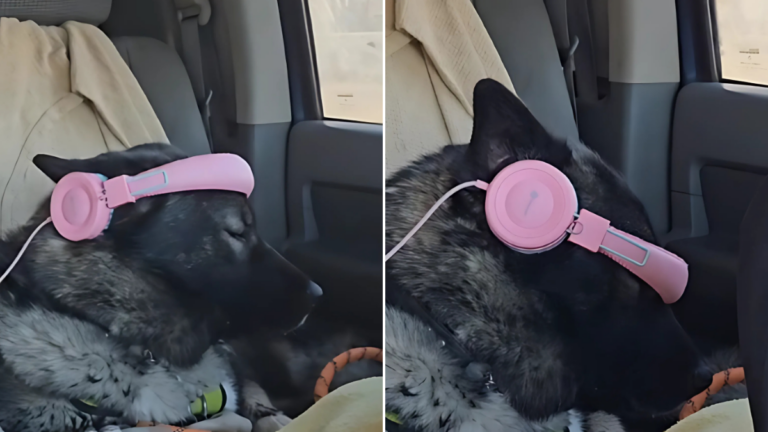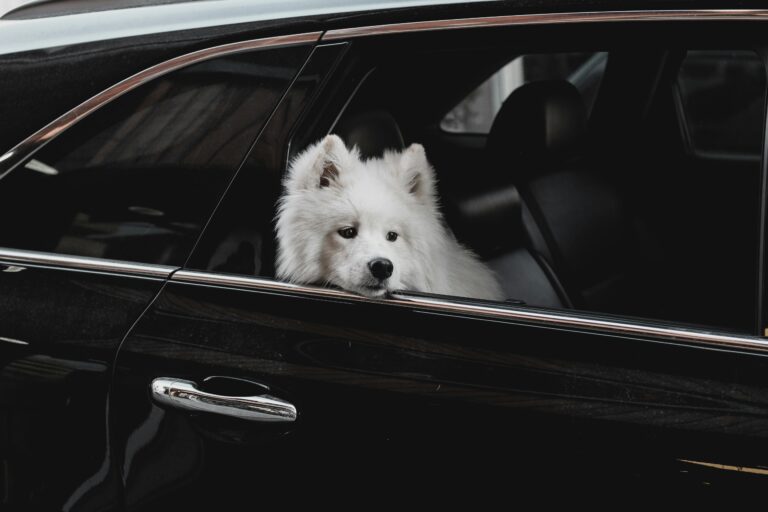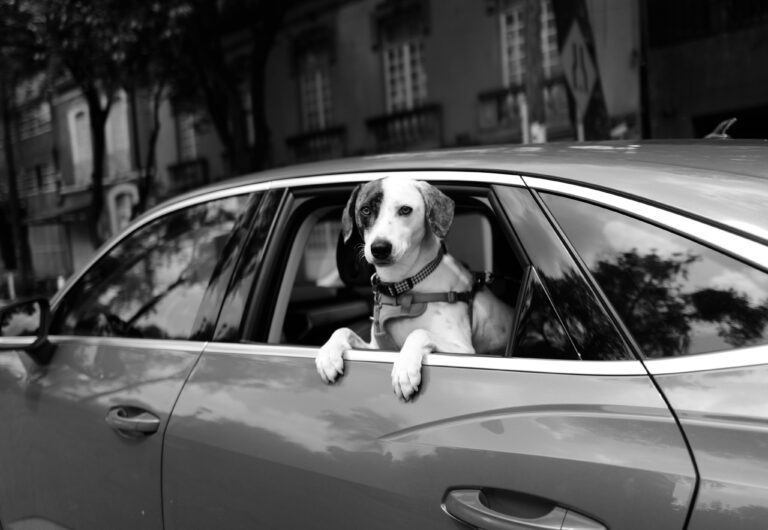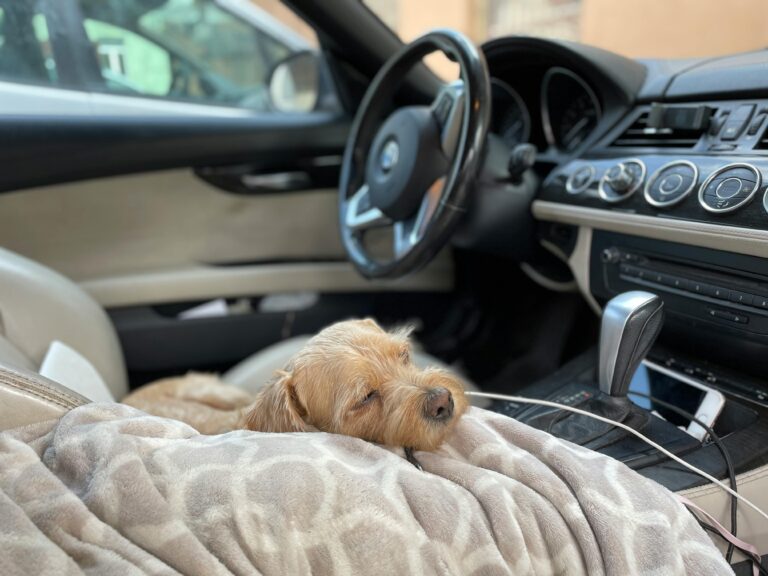Little Girl’s Perfect Cure for Dog’s Motion Sickness is a Must-See
There are two kinds of dogs: those whose tails wag furiously with pure excitement when they realize they’re going on a car ride, and those who dread hearing the jingling of car keys. For most dogs that fall under the second category, motion sickness is to blame.

One little girl found an exceptionally adorable trick to curb their family dog’s persistent motion sickness. For Maya — a Malamute-Akita mix — car rides are anything but a pleasant experience. According to Maya’s owner, the constant car sickness prompted her daughter to make an audio recording showering Maya with soft praises of how much of a good girl she is.
Her goal? To let Maya listen to this recording whenever she’s riding in the car, hoping it will calm her down. Surprisingly, the recording worked!
In a video shared on TikTok account @maya.the.malakita, sweet Maya can be seen dozing off with headphones on, and it’s obvious the audio recording is doing wonders in helping her relax.
“So, my daughter made an audio recording telling my dog what a good girl she is, put on the headphones, and now she’s asleep,” reads the text layered over the heartwarming clip.
Watch the video below:
@maya.the.malakita this melted my heart🥹🩵 #cute #love #dogsoftiktok #family #fypage ♬ original sound – Marlie, Fletcher & Me
Motion Sickness in Dogs: What You Need to Know
Motion sickness — also called car sickness — is common in dogs, just as it is among humans.
Car sickness in dogs mainly stems from a sensory conflict between the vestibular system (located in the inner ears) and the visual cortex (in the eyes). You see, the vestibular system helps your pup maintain balance and posture. During car rides, the visual cortex may send signals to the brain that your dog isn’t moving. The vestibular system, on the other hand, may signal the brain that your pup is, in fact, in motion, leading to conflicting input to the brain.
Ultimately, these conflicting signals trigger a distress response from a part of your dog’s brain called the “vomiting centre,” hence the motion sickness. Motion sickness is commonly seen in puppies because of their underdeveloped vestibular system.
“Motion sickness in dogs, especially in puppies, is common. This is often because their inner ear isn’t fully developed. Most puppies outgrow it after their 1st birthday,” explain experts at Dr. Shiba Wellness in an Instagram post.
It’s also worth noting that for other dogs, motion sickness in dogs could be primarily due to anxiety triggered by a previous traumatic traveling experience. In this case, anxiety activates their body’s flight-or-fight response, which manifests as motion sickness.
8 Common Symptoms of Motion Sickness in Dogs
According to the MSD Veterinary Manual, among the common signs of motion sickness in dogs include:
- Nausea and vomiting
- Excessive drooling
- Excessive lip licking
- General restlessness
- Shaking/trembling
- Yawning
- Whining
- Diarrhea
How to Prevent Motion Sickness in Dogs
If your furry friend often gets car sick when traveling, there are a couple of steps you can take to resolve the issue. Here are a few tips to try:
1. Condition Your Dog to Travel
Signs such as excessive drooling, yawning, lip smacking, and whining are indicators of anxiety-induced motion sickness. If your dog’s car sickness is caused by anxiety, conditioning them to get used to car rides using a positive reinforcement approach can go a long way in addressing the problem.
This typically involves taking them on short trips first to fun places rather than long trips, and rewarding them with treats and praise before they show any signs of anxiety. Remember, conditioning requires consistency and patience.
“My older girl (now 2) had terrible motion sickness. She would literally leave puddles of slimy drool on the leather seats. It took almost a year before she became fully comfortable in the car, and that was with me taking every possible opportunity to get her in the car. I took her on every errand whenever possible. She’s now a pro and loves the car and even goes road trips with no problem,” commented user @OkSherbert2281 in a Reddit discussion on dealing with motion sickness in dogs.
2. Consider Medication for Motion Sickness in Dogs
Thankfully, there are several anti-histamine and anti-nausea medications that help reduce nausea and vomiting in dogs with car sickness. Some of these common over-the-counter drugs include Benadryl and Dramamine. However, it’s advisable to consult your vet before using any drug to address your dog’s motion sickness symptoms.
3. Keep the Car Cool During Rides
Ensuring there’s fresh air flowing in the car while traveling with your dog can greatly help reduce the symptoms of motion sickness. So, consider lowering the windows or turning on the air conditioner for the sake of your car-sick pup.
“We had a dog who got super car sick. Having him sit up front (between the front seats of our van) with some air vents aimed right at his face, blasting the coldest air possible, helped a lot. We encouraged him to look out the front window, and that also helped,” wrote user @Kessed in a Reddit discussion on tips for dogs with car sickness.
4. Avoid Feeding Your Pup Right Before Traveling
If your dog usually gets motion sickness, avoid giving them a heavy meal before traveling.
“I tried to wait at least an hour after my pup had eaten before going in the car. I also encouraged him to lie down and put the air con on to keep him cool. He was only car sick once, in my mum’s car, because he ate immediately before we set off,” shared user k-wat13 in a Reddit discussion thread on Car sickness in dogs.
5. Try Natural Remedies
According to experts at the American Kennel Club, placing cotton balls laced with a few drops of pure chamomile or lavender oil inside the car (at least thirty minutes before the trip starts) can help curb your dog’s motion sickness.
In addition, homeopathic products such as Nux vomica can also help car-sick dogs, but it’s best to speak with your vet before administering these products to your pup. Ginger is also considered an excellent natural remedy for dogs that experience nausea and vomiting during car rides.
“My Cavapoo gets super car sick, and the only thing that worked and helped settle his tummy is ginger. Fresh ginger is fine to give dogs; he never threw up again. It settled his tummy, and he started enjoying car rides. Don’t forget to wait for 30 minutes or so for it to work,” reads one comment in a Reddit discussion on remedies for car motion sickness in dogs.
Motion Sickness in Dogs FAQs
Do dogs get car sickness?
Yes, some dogs, especially puppies, may experience motion sickness while traveling.
Homeopathic remedies for motion sickness in dogs
Experts say homeopathic products such as Nux vomica can help with car sickness in dogs.
Medicine for motion sickness in dogs
There are various anti-nausea and anti-histamine drugs for dogs with car sickness. However, it’s advisable to talk to your vet before giving any drug to your car-sick dog.
Motion sickness in dogs symptoms
As noted earlier, motion sickness in dogs is associated with symptoms such as nausea, vomiting, excessive drooling, lip smacking, whining, and trembling.
Dramamine for motion sickness in dogs
Dramamine is an antihistamine that helps treat motion sickness in dogs. However, you should consult your vet before giving your dog Dramamine.
Ginger for motion sickness in dogs
Giving your dog ginger at least thirty minutes before traveling can help ease the symptoms of motion sickness.
Motion sickness in dogs natural remedy
As explained earlier, you can place a cotton ball laced with lavender or chamomile oil in the car or let your dog chew a piece of ginger prior to traveling.



